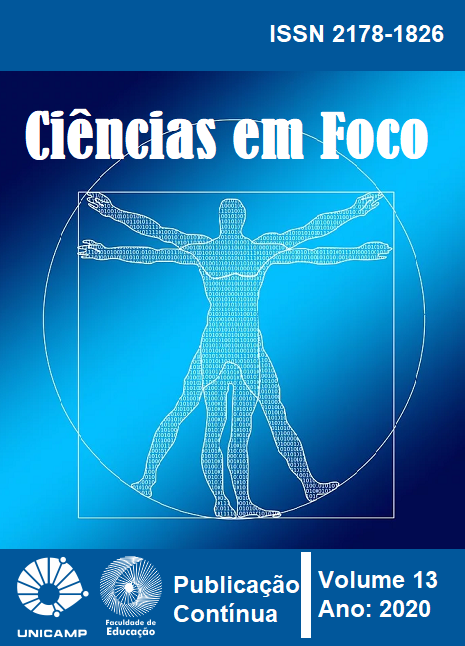Abstract
This theoretical-reflective study approaches the potential of blended learning and the study of nature, in nature, for the study of environmental themes in basic education. The perception that current discourses on the evolution from education to 5.0 education do not seem to appreciate the reconnection between humanity and nature, essencial to face the environmental problems of our century, did us to weave a theoretical framework based on research about the benefits of contact with nature, the systematic study of nature in natural environments and the methodology of blended learning, resulting in a reflective exercise which describes a continuous work of environmental education, with theoretical and practical developments, in 5.0 school that we want: hybrid, with all the prerogatives that technological and pedagogical innovations can offer, but with a focus on reconnecting environment-society, humanity-nature, as fundamental condition for the construction of a socially just and environmentally sustainable and balanced future.
References
CAMPOS, C. R. P. A saída a campo como estratégia de ensino de ciências: reflexões iniciais. Revista Eletrônica Sala de Aula em Foco, v. 01, n. 02, p. 25-30, 2012.
CHRISTENSEN, C. M. HORN, M. B. STAKER, H. Ensino híbrido: uma inovação disruptiva? Uma introdução à teoria dos híbridos. Clayton Christensen Institute, 2013. Disponível em: https://porvir.org/wp-content/uploads/2014/08/PT_Is-K-12-blended-learning-disruptive-Final.pdf. Acesso em: 08 jun. 2020.
COELHO, A. VALE, V. BIGOTTE, E. FIGUEIREDO-FERREIRA, A. DUQUE, I. PINHO, L. Oferta educativa outdoor como complemento da educação pré-escolar: os benefícios do contato com a natureza. Revista de Estudios e Investigación en Psicología y Educación, v. extr. n. 10, p. 111-117, 2015. Disponível em: https://www.researchgate.net/publication/285549665_Oferta_educativa_outdoor_como_complemento_da_Educacao_Pre-Escolar_Os_beneficios_do_contacto_com_a_natureza. Acesso em: 07 jun. 2020.
KUO, M. BARNES, M. JORDAN, C. Do experiences with nature promote learning? Converging evidence of a cause-and-effect relationship. Frontiers in Psychology, 19 feb. 2019. Disponível em: https://www.frontiersin.org/articles/10.3389/fpsyg.2019.00305/full. Acesso em: 07 jun. 2020.
LAYRARGUES, P. P. LIMA, G. F. C. As macrotendências político-pedagógicas da educação ambiental brasileira. Ambient. Soc., São Paulo, v. 17, n. 1, p. 23-40, mar. 2014. Disponível em: http://www.scielo.br/scielo.php?script=sci_arttext&pid=S1414-753X2014000100003&lng=en&nrm=iso. Acesso em: 13 mar. 2020.
LÉVY, P. Cibercultura. São Paulo: Ed. 34, 1999.
LIMA, M. S. L. ROCHA, S. S. Professor em EaD: saberes constituídos, lições aprendidas. Anais do I Simpósio Internacional de Educação a Distância (SIED) e I Encontro de Pesquisadores em Educação a Distância (EnPED), 1, 2012. São Carlos: Secretaria Geral de Educação a Distância (SEaD – Universidade Federal de São Carlos), 2012. Disponível em: http://sistemas3.sead.ufscar.br/ojs/Trabalhos/115-765-1-ED.pdf. Acesso em: 02 abr. 2020.
MORAN, J. M. BACICH, L. Aprender e ensinar com foco na educação híbrida. Revista Pátio, n. 25, p. 45-47, jun. 2015. Disponível em: http://www2.eca.usp.br/moran/wp-content/uploads/2015/07/hibrida.pdf. Acesso em: 08 jun. 2020.
MORIN, E. CIURANA, E. R. MOTTA, R. D. Educar na era planetária: o pensamento complexo como método de aprendizagem no erro e na incerteza humana. São Paulo: Cortez; Brasília, DF: UNESCO, 2003.
MORIN, E. Os sete saberes necessários à educação do futuro. 5ed. São Paulo: Cortez; Brasília, DF: UNESCO, 2002.
SEBRAE – Centro de Referência em Educação Empreendedora. Entenda a Educação 5.0. s.d.a. Disponível em: https://cer.sebrae.com.br/educacao-5-0-x-4-0/. Acesso em: 05 jun. 2020.
SEBRAE – Centro de Referência em Educação Empreendedora. Soft skills. s.d.b. Disponível em: https://cer.sebrae.com.br/soft-skills/. Acesso em: 05 jun. 2020.
SENICIATO, T. CAVASSAN, O. Aulas de campo em ambientes naturais e aprendizagem em ciências – um estudo com alunos do ensino fundamental. Ciência & Educação, v. 10, n. 1, p. 133-147, 2004.
VAUGHAN, N. D. A blended community of inquiry approach: linking student engagement and course redesign. The Internet and Higher Education, Amsterdã, n. 13, p. 60-65, jan. 2010. Disponível em: https://www.sciencedirect.com/science/article/pii/S1096751609000645. Acesso em: 09 jun. 2020.
VIVEIRO, A. A. DINIZ, R. E. S. Atividades de campo no ensino das ciências e na educação ambiental: refletindo sobre as potencialidades desta estratégia na prática escolar. Ciência em Tela, v. 2, n. 1, 2009. Disponível em: http://www.cienciaemtela.nutes.ufrj.br/artigos/0109viveiro.pdf. Acesso em: 08 jun. 2020.

This work is licensed under a Creative Commons Attribution-NonCommercial-ShareAlike 4.0 International License.
Copyright (c) 2020 Ciências em Foco

